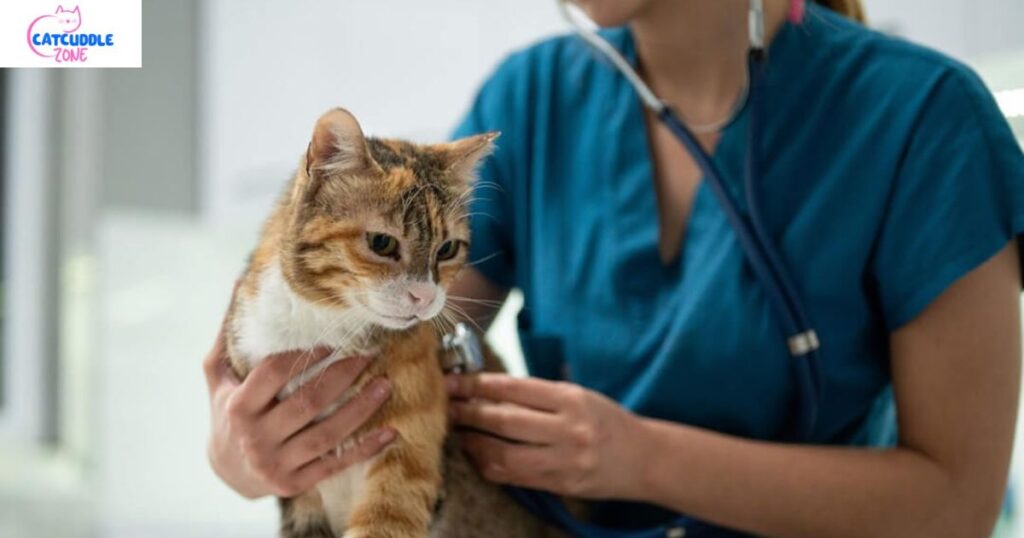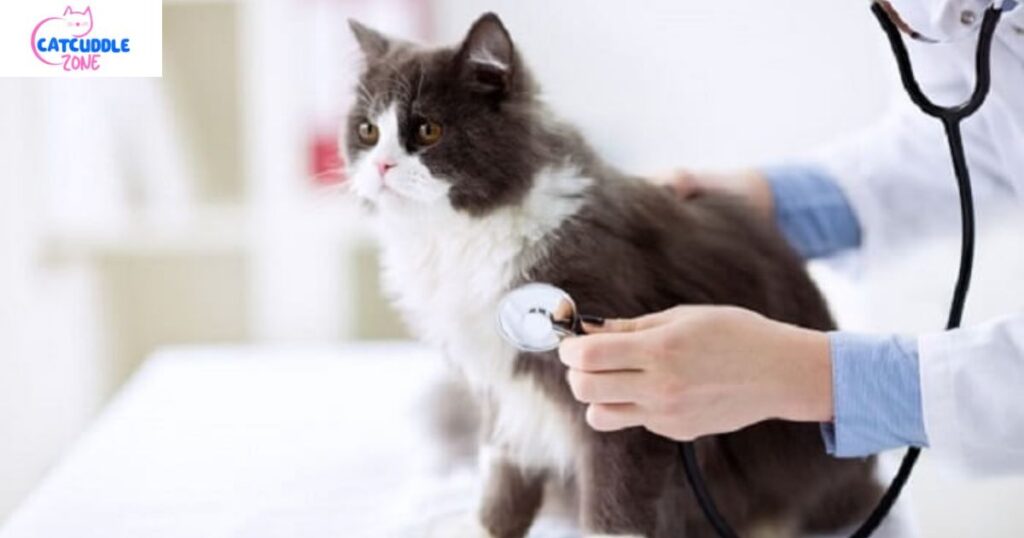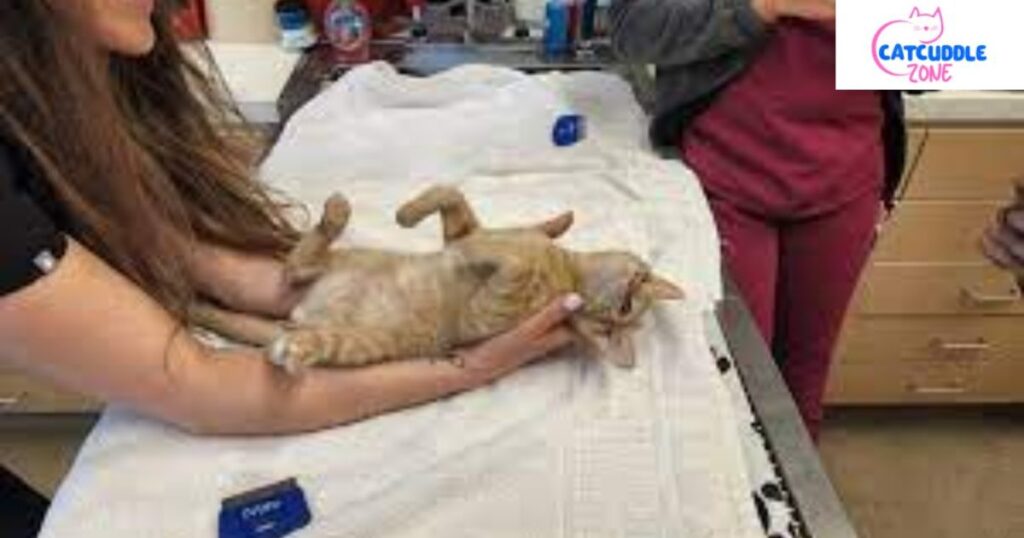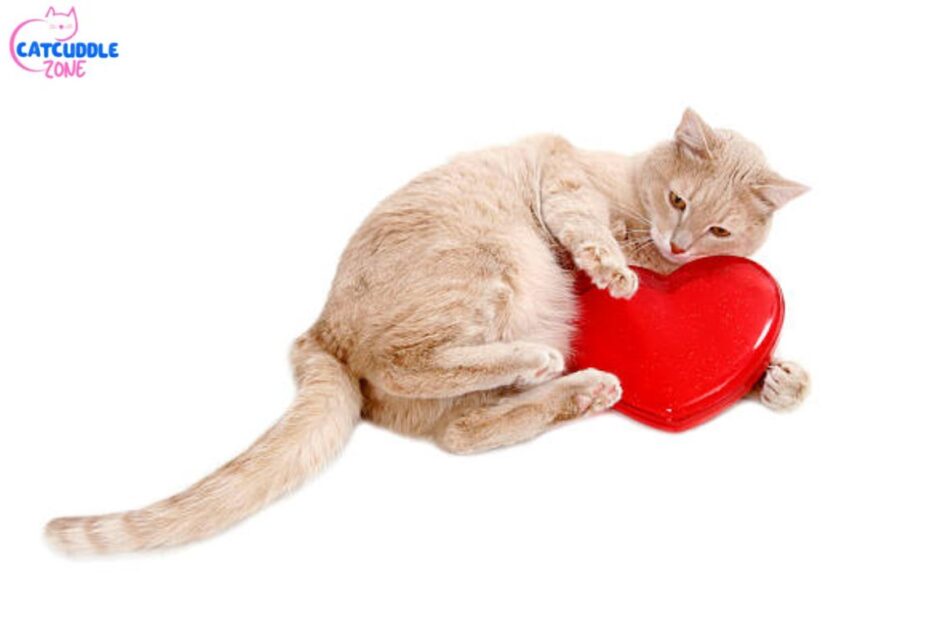What Is a Heart Murmur in Cats?
A feline heart murmur is an abnormal heart sound in cats that is usually heard during feline cardiac auscultation with a stethoscope. Normally, a cat’s heart makes two sounds, “lub” and “dub.” When there is an extra sound or a “whoosh,” it suggests blood flow turbulence in cats. This sound may mean there is an issue with feline cardiovascular health.
A murmur can result from problems like feline heart valve disease, an atrial septal defect, or even anemia. Sometimes, a vet finds an innocent heart murmur in cats during a routine checkup. These murmurs are not caused by disease and may disappear over time. Still, any cat heart problem should be checked to make sure it is not linked to feline hypertrophic cardiomyopathy (HCM) or feline congestive heart failure (CHF).

Understanding the Heart Murmur Grading System
Vets use the heart murmur grading system (Grade I–VI) to measure loudness. Grade I is faint and hard to hear, while Grade VI can be heard without a stethoscope touching the chest. The murmur grade helps guide diagnosis but does not always tell how severe the disease is.
A benign vs pathologic murmur in cats can sound similar. For example, a congenital heart murmur in kittens may be quiet, while an acquired heart murmur in cats linked to HCM may be louder. Vets often need tests like a feline echocardiogram / cardiac ultrasound or cardiac proBNP blood test to confirm the underlying cause.
| Grade | Description | Notes |
| I–II | Soft, faint | Hard to detect, often benign |
| III | Moderate | Common in cats, may suggest disease |
| IV–V | Loud, with vibration | Often linked to structural problems |
| VI | Very loud | Heard without stethoscope on chest |
Causes of Heart Murmurs in Cats
Kittens are born with a congenital heart murmur. This could occur as a result of defects such as ventricular septal defect, patent ductus arteriosus (PDA) or defective heart valves (mitral, tricuspid, aortic, pulmonic). Some of these defects can be cured during the course of the kitten development, whereas some require surgery due to PDA or long-term observation.
In cats, heart murmur with the acquisition is later in life. They can include hypertrophic cardiomyopathy (HCM), dilated cardiomyopathy (DCM), anemia, hyperthyroidism, heart worm disease, endocarditis, etc. Such breeds of cats are more prone to cat heart problems as Maine Coon, Persian, American Shorthair, British Shorthair and Siamese.
Symptoms of Heart Murmurs in Cats
Not all cats exhibit symptoms during the initial stage. The murmur is normally detected during a physical examination by a vet. Later stages of the disease can result in coughing, asthma, fatigue, or even impulsive collapse in the pet. Cats may exhibit such signs as blue-gums, elevated respiratory rate, or painful vocalization.
Developed ones could result in hind limb paralysis, weakness, or loss of appetite caused by feline congestive heart failure (CHF) or thromboembolism. The prognosis of a feline heart murmur is specific to the speed with which such signs are treated. The protection of lifespan of cats having heart murmurs relies on early detection.

How Veterinarians Diagnose Heart Murmurs
The physical examination begins with a diagnosis that starts with auscultation. A vet observes the sounds of abnormality through a stethoscope to determine the grade of the murmur, the time, and the place of the abnormality. This, however, is not enough to prove the cause.
In order to identify the root, the vets can request a chest radiograph, a feline echocardiography / cardiac ultrasound, an electrocardiogram (ECG/EKG), or a cardiac proBNP blood sample. These tests are used to diagnose HCM, CHF or such issues as hyperthyroidism. Fluid around the lungs may also be seen in the chest X-rays and blood tests exclude anemia and general problems.
Treatment Options for Cats with Heart Murmurs
The treatment of heart murmur in cats depends on the cause. An innocent murmur usually needs no therapy but requires regular vet checks. For severe reasons, it can be treated with feline cardiac medications (benazepril, furosemide), oxygen, or fluid drainage using diuretics (furosemide).
Thoracocentesis may be enacted to drain-off fluid in severe cases and surgery can remedy anomalies such as PDA. It can be helpful to manage such conditions like anemia or thyroid disease. The plans of each cat are different and the owners must liaise with theirvet and give the best care.
Prognosis and Life Expectancy with a Heart Murmur
In cats, the prognosis of heart murmurs is different. Cats with benign murmur can lead a normal life with minimal or no therapy. Conversely, cats diagnosed with HCM or CHF might end up having reduced life expectancy in the event they are not treated in time.
The survival of cats that have heart murmurs is affected by the age, the cause and the response to treatment. When properly monitored over the long term and using the correct feline cardiac medication (benazepril, furosemide), a significant portion of cats can live comfortably for many years. It tends to focus on quality of life as opposed to cure.

Heart Murmur in Kittens vs Adult Cats
A heart murmur in kittens often occurs as a congenital and then may stop to disappear. The cats may be having innocent heart murmurs which vanish entirely within six months. Nevertheless, it is a good idea to follow up with a vet, as it makes sure that there are no latent cat heart issues.
Murmurs are more likely to be acquired in adult cats. These can be as a result of HCM, DCM or feline heart valve disease. Old cats can also have murmurs that can be associated with hyperthyroidism or anemia. Close long term follow up on heart murmur in old cats is usually necessary in order to avoid complications.
Preventing Complications and Supporting Heart Health
Although not every one of these murmurs can be avoided, these risks can be mitigated by supporting the cardiovascular health of felines. Heart wellness, regular vet visits, and early diagnosis, such as a feline echocardiogram / cardiac ultrasound, can help. Even approved supplements used by a vet can be included in cardiac functions.
Those pet owners ought to take their pets to the veterinarian checkups regularly, particularly the breeds that are at a high risk such as Maine Coons or Siamese. Early diagnosis will help to keep a check on benign murmur and to diagnose such conditions as CHF or thromboembolism before they deteriorate. Prevention therapy has a significant positive effect on the total life span of the cat with the heart murmur.
FAQs About Heart Murmurs in Cats
Can a cat live a normal life with a heart murmur?
Yes, many cats with innocent murmurs or benign murmurs live long, healthy lives. With proper long-term monitoring, treatment ensures comfort.
Do all murmurs sound the same in cats?
No, murmurs vary in murmur grade, pitch, and location. Only tests like an echocardiogram confirm their seriousness.
What is an innocent murmur in cats?
An innocent heart murmur in cats is a harmless sound without disease. These often resolve in young cats.
When should I worry about my cat’s heart murmur?
If your cat shows signs like coughing, wheezing, blue gums, or collapse, urgent care is needed.
Is heart murmur common in older cats?
Yes, heart murmurs in senior cats are common and often linked to HCM, CHF, or feline heart valve disease. Regular vet care is crucial.
